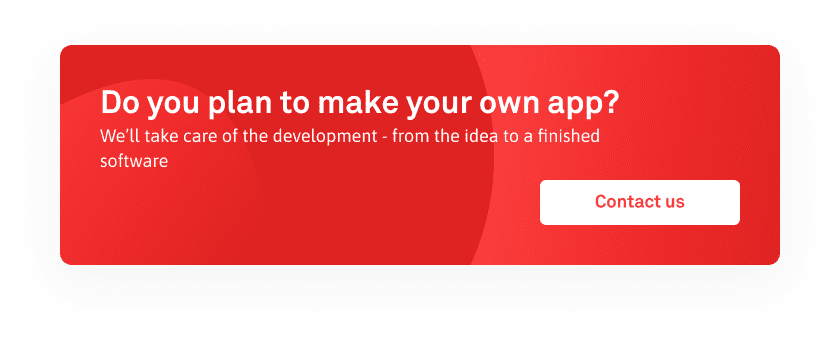When’s the last time you had a bright new idea to build an app? You confirmed there isn’t another app out there that compares, you’re confident there’s a demand for it, and you’re on the verge of teaming up with a developer to make it a reality. This is all great news.
Unfortunately, it’s also the point where most people get stuck in the app development process. Before you start the process, you must first decide how you want the app built. With the technology available today, you’re left with a wide range of options that cause a bit of confusion.
App owners must decide between a mobile or web app, native or hybrid app, and even an MVP or full-blown app. You also must decide between hiring a professional developer or doing it yourself, which opens a wide range of possibilities.
The truth is there are plenty of ways to build an app, and the ‘best way’ depends on the app itself. Since it varies from app to app, let’s take a look at the differences in each scenario to determine which way is best for you.
Are you interested in a mobile or web app?
The first decision leading up to the app development process is choosing between a mobile or web app. Contrary to popular belief, there are strict differences between the two.
A mobile app is found in an app store on a mobile device. They’re generally built for Android devices or Apple devices and can access the mobile device’s hardware or features. While some require an internet connection and some don’t, all mobile apps live and run on the device itself.
Web apps, on the other hand, live and run in the internet browser. While they can be accessed via a mobile device, they’re not considered mobile apps because they’re only accessed via the internet browser – Safari, Chrome, Internet Explorer, etc. They have limited access to the device’s hardware and always require an internet connection.
If you’re concerned about cost, web apps are cheaper to build and cheaper to maintain. If you’re more concerned about user experience, security, and function, mobile apps are more robust and widely accepted.
Do you want to build a native or hybrid app?
Let’s say you’re interested in building a mobile app. Beyond that, you need to decide whether you want a native or hybrid mobile app. Native apps are those that live on a specific operating system – either Android or iOS. Hybrid apps, on the other hand, are built for multiple operating systems.
What most people don’t realize is that Android apps and iOS apps require different code. Writing code for an Android app means the app only works on Android devices. Writing code for an iOS app means the app only works on iOS devices. These are both native apps.
A hybrid app is essentially a web app built as a mobile app. It uses code that both operating systems understand, making it more versatile and accessible.
Native apps are recommended for tight budgets and a quicker time-to-market. Hybrid apps might cost more and take longer to develop, but they save you money in the long run.
Are you interested in an MVP or full-blown app?
The third decision on your plate is choosing between a full-blown app and an MVP. Building a full-blown app takes more time and is more expensive than an MVP, but the user is provided with a more robust experience.
An MVP, also known as a minimum viable product, only consists of the core functions – opposed to building the app in its entirety. It’s cost-effective and allows you to release an app in less time, but users aren’t given the full experience.
One of the great things about going the MVP route is having the ability to roll out future updates as the app gains popularity. App owners use the feedback they receive from the MVP to improve it. This saves you from adding features that the users don’t benefit from.
If you’re in a rush with your app, consider the MVP route. If you have the time and are confident there’s a demand for your app, consider building your app in its entirety.
Should you hire a developer or develop the app yourself?
The fourth decision you must make doesn’t involve how the app is made, but rather who makes the app. You can save a lot of money writing the code yourself, but it requires a lot of experience, knowledge, skill, and patience.
When building an app, it’s highly recommended to hire a professional developer to ensure the best user experience. There is a wide range of complications experienced throughout the process, and your developer needs to be well-prepared to avoid any mistakes.
If you decide to hire a developer, you’ll have a secondary decision between hiring a team of developers or hiring a freelancer. Freelancers are often cheaper, but there’s only one person working on your app. If they have other projects, there’s a good chance they’re not giving 110% to your app.
On the other hand, there is a wide range of options when you build an app yourself, and they don’t all require the use of code. There are plenty of ‘cookie-cutter apps’ that are already made for you – all you do is customize it and make it your own. It’s a much quicker option than learning to code yourself, which could take years.
Which Process Suits Your Idea Best?
The mobile app development process is different for everyone. There’s no one-size-fits-all solution when trying to build an app, but the key is finding the right process that suits your idea best. When you achieve that, you set your app up for sustained success.
At Code Bright, we understand there’s a lot to digest when building an app. Finding the right process is a daunting task for many and is feared by the app owner in most cases. We believe it’s important to avoid the panic with a quality team of developers by your side.
We’ve built a wide range of apps in a variety of different industries. We know how unique each app is, and we know how to bring out the best in our client’s ideas. If you’re struggling to determine the best way to build an app or are ready to begin the development process, contact us today. We can’t wait to share our talent with you!



